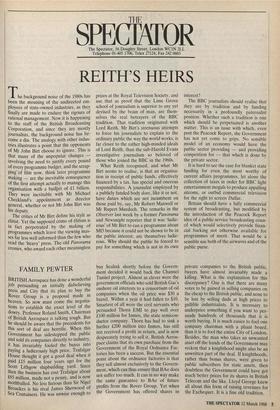THE
SPECTATOR
The Spectator, 56. Doughty Street, London WC11■1 2LL Telephone 01-405 1706; Telex 27124; Fax 242 0603
REITH'S HEIRS
The background noise of the 1980s has been the moaning of the undirected .em- ployees. of state-owned industries, as they finally are Made to endure the rigours of rational Management. NOW it is happening to the staff of the . British Broadcasting Corporation, and since they are mostly journalists, the background noise has be- come a din. The analogy with, other indus- tries illustrates a point that the opponents of Mr John Birt choose .to ignore. This is that many of the unpopular changes — involving. the 'need to justify every pound of every programme budget, and the scrap- ping of film now, think later programme making — are the inevitable consequence of the first attempt actually to manage this organisation with a bildket of .£1 billion. They were inevitable with Mr Michael Checkland's • appciintinerit as director general, whether or not Mr John Birt was his deputy. . • ' The critics of Mr Eiirt define his style as elitist. Yet the supposed crime of elitism is in fact perpetrated by the nuking of programmes which leave the viewing mas- ses far less well informed than the few who read the 'heavy' press. The old Panorama cronies, who award each other meaningless prizes at the Royal Television Society, and use that as proof that the Lime Grove school of journalism is superior to any yet devised by the brain of man, are them- selves. the real betrayers Of the BBC tradition. That tradition originated with Lord Reith. Mr Hirt's. strenuous attempts to force his journalists to explain to the ordinary public the way the world works, is far closer to the rather high-minded ideals of Lord Reith, than the sub-Harold Evans investigative journalism so beloved of those who joined the BI3C in the 1960s.
What Reith recognised, and what Mr Birt seems to realise, is that an organisa- tion in receipt of public funds, effectively financed by a tax, has special and onerous responsibilities. A journalist employed by a publicly funded body do. es, like it or hot, have duties which are not incumbent on those paid by, say, Mr Robert Maxwell or Mr Rupert Murdoch. The remarks in the Observer last week by a former Panorama and Newsnight reporter that it was 'ludic- rous' of Mr Birt to can a programme about MIS because it could not be shown to be in the public interest, are themselves ludic- rous. Why should the public be forced to pay for something which is not in its own interest?
The BBC journalists should realise that they are by. tradition and by funding necessarily in a profoundly paternalist position. Whether such a tradition is one which should be perpetuated is another matter. This is an issue with which, even post the Peacock Report, the Government has not yet come to grips. No sensible model of an economy would have the public sector providing — and providing competition for — that which is done by the private sector.
It is hard to see the case for blanket state funding for .even the most worthy of current affairs programmes, let alone the collection of taxes in order for BBC light entertainment moguls to produce appalling sitcoms, or outbid commercial television for the right to screen Dallas.
Britain should have a fully commercial system of broadcasting, but modified by the introduction of the Peacock Report idea of a public service broadcasting coun- cil which wOuld selectively provide finan- cial backing not otherwise available for programmes of merit. That would be a sensible use both of the airwaves and of the public purse.


















































 Previous page
Previous page